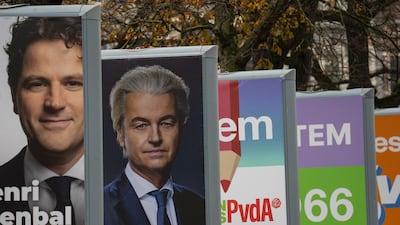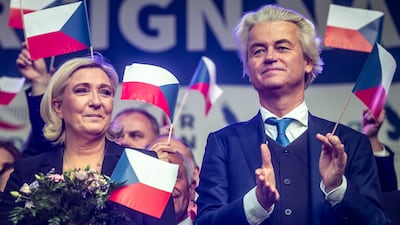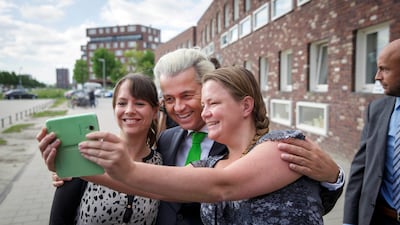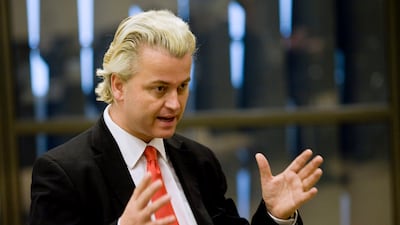In the bitter wind blowing off the North Sea, supporters crowded in on the unmistakeable figurehead of the Netherlands’ hard right, Geert Wilders, during a victory lap visit to a suburb on the outskirts of The Hague.
“We love you Geert,” a shaven-head man shouted. “You will make the Dutch great again.”
Uniformed police surrounded Mr Wilders as he was mobbed by supporters and a media scrum packed around him.
In the chill darkness 100m away, watching through the windows of the Hotel Atlantic, were 120 Syrian asylum seekers who had been given emergency accommodation.
Their presence – which had not gone down well among the well-heeled burghers of the town – summed up the shift in the make-up of the country and the uncertain future for those of a different background to the cheering crowd of Wilders supporters.
Wilders the victor
Mr Wilders's stunning election win was confirmed officially on Friday, heralding a potentially dangerous passage for the Netherlands, Europe and their Muslim citizens.
However, the far-right Dutch leader faces an uphill battle to forge a coalition with other parties uncomfortable with his anti-Islam views.
The election committee said Mr Wilders and his PVV Freedom Party had won 37 seats in the 150-seat parliament, an unexpected surge for the far-right that sent shockwaves through Europe and beyond.
All eyes are now on whether he can build a governing coalition and become the country's first far-right prime minister.
Banning the Quran, outlawing the hijab and closing mosques have been the Freedom Party leader’s demands, although he promised during the election to keep his anti-Islamic policies on ice.
“Wilders said he wants to put them in the refrigerator, but they belong in the garbage,” influential Muslim community leader Nourdin El Ouali, 42, told The National, explaining that refrigerated items can always be used later at a suitable moment.
He said that economic challenges or an extremist atrocity could be that opportunity, “because then hearts and minds will be more open to his policies”.
With a population of 18 million, including a million Muslims, the Dutch are a small nation but one with wealth and influence.
The concern is that Mr Wilders’s victory brings the drumbeat of right-wing anti-immigrant policies further into the mainstream, following the success of hardliners in Sweden, Hungary, Slovakia and Italy.
It will take only the European giants of France and Germany to vote in hard-right politicians for the continent to become an even more uncomfortable place for Muslims.
“France and Germany are the guide countries for Europe,” said Mr El Ouali, director of Spior, an umbrella organisation for 100 Muslim groups. “So this election is a game changer because it is further normalising Wilders’s views and our concerns are that we are being treated as second-class citizens.”
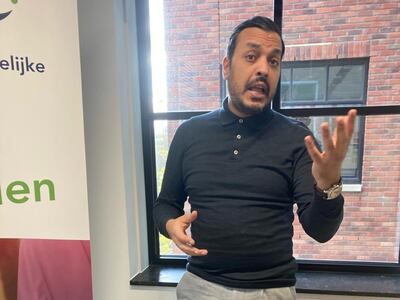
What just happened?
Like many populists, Mr Wilders has a unique appearance, from his highly identifiable coiffured, peroxide-blond hair to his anti-Islamic invective.
But the latter he carefully fogged out in the election earning the nickname “Milders” by using a softer tone of voice and less radical language.
His approach was simplistic – the lack of jobs and houses is down to the influx of migrants. The argument resonated.
This apparent metamorphosis disguises a past in which he had equated the Quran to Adolf Hitler’s Mein Kampf, stirring such ire that for the past 20 years he has required armed police protection.
Geert (pronounced “Hurt”) Wilders, 60, is a veteran of Dutch politics with the cunning to realise that when the conservative-liberal VVD-led government coalition collapsed largely over the migration issue he had a platform from which he could trumpet loudly.
A crucial mistake was made by the VVD when its leader admitted that it would go into coalition government with the PVV, legitimising them.
“Wilders out-foxed them all,” said Caroline de Gruyter, a European affairs journalist and a member of the European Council on Foreign Relations. “For the first time he saw the door ajar, he pushed it open, saying, ‘I am willing to compromise and put my most unconstitutional proposals aside’ and becomes apparently nice and stops being an extremist.”
Clearly it worked, shocking many Dutch and beyond.
To gain power Mr Wilders will need a coalition of three or four parties, but that could be problematic because few want to be tainted in sharing power with the extremists.
However, their hand might well be forced as the people have spoken and will view it as anti-democratic if the PVV were denied power.
“My best guess would be that we have a minority government or the PVV in coalition with someone else as prime minister from another party so that the stain of the radical right is less clear,” said Dr Marcel Hanegraaff, a political lecturer at the University of Amsterdam.
In 2022, 200,000 migrants entered the Netherlands, the highest number since the Syrian crisis a decade earlier, with the average usually 60,000 a year.
The VVD government of Mark Rutte had closed refugee centres to save money but is now being forced to put them up in hotels such as the Atlantic as winter arrives.
Coalition quandary
Before the election earthquake the VVD said it would govern with the PVV in the mistaken belief it would remain the senior party, but now the people have voted.
“The worst thing that can happen is that Wilders is not prime minister or is not part of a coalition as the protests will become even more angry,” said Lucas van Houtert, a local newspaper journalist in Eindhoven. “We are still working within the borders of democracy, which some want to step out of and be more revolutionary.”
Even a Syrian taxi driver in Rotterdam who fled Aleppo nine years ago told The National that “we of course have to respect the vote”, although Muslims are afraid of what Mr Wilders might do once in power.
Mr El Ouali agreed. “The best thing is to honour the elections, but it is very hard, maybe impossible, for someone like Geert Wilders to unify society,” he said at his office in Rotterdam.

Brexit moment?
“The impact on us is like Brexit on Britain,” said Denny van der Vlist, of the Institute of Political Science at Leiden University. “It’s a shock that the PVV have become the largest party in the Netherlands and are potentially providing the next prime minister.”
While Mr Wilders said “I will be a prime minister for all”, his programme clearly indicated “rather extreme options”. Mr Van der Vlist added: “I would not necessarily argue that he has become mild in any way.”
The other issue is that Mr Wilders appears to have no vision for the Dutch, bar his migrant policy.
“He doesn't have a story for the future except that everything was better in the past,” Mr El Ouali said. “He has also previously said it would be a good idea to have 16 million fewer Muslims in Europe.”
“Wilders would feel very comfortable in the right wing of the Conservative party where many share his views,” said former Dutch navy officer Martinus Berkien, originally from Delft.
“This is very much the result of years of bungling by Rutte cabinets, including the notion that the market will solve problems such as housing,” he added.
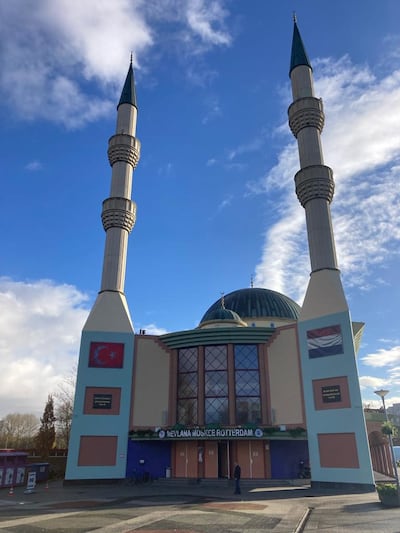
Assimilate, deport, ethnic cleanse
The worry for Muslims – and with good reason – is that the constitution will not protect their rights. The Dutch security services have conducted covert surveillance of people entering certain mosques, a practice not within the law.
Muslims with dual citizenship have also fallen foul of tax benefit laws for children after they were blacklisted for allegedly misusing the break.
There is also a concern that Mr Wilders is no longer referred to as an extremist in Dutch media, who are “doing everything to say that we don’t have a problem”, Mr El Ouali said.
The reality of Mr Wilders’s success is that the Muslim community sees itself confronted with three unpleasant outcomes, Mr El Ouali said.
One is forced assimilation, in which Muslim culture is lost, the second is deportation of those convicted of crimes requiring 10 years incarceration being “denaturalised and sent to a country that they might never have been to”.
It might sound far-fetched within the legal structures of the European Union, but the third outcome could be ethnic cleansing, with the Muslims in Bosnia the most recent example.
“When you see a majority not happy, or worse, disgusted with the minority, then history teaches us there are three main choices that societies may take,” he said.
“This is going on in Europe and that's very scary. I don't even see the start to a solution or a different approach as we’ve had two decades of normalised extreme thoughts and beliefs since 9/11.”
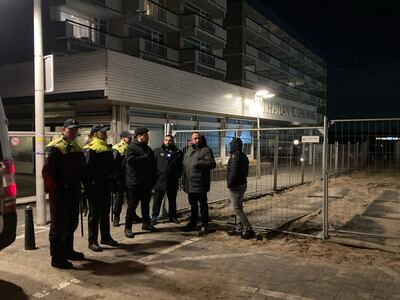
Gaza impact
The war may have had some effect on the vote, with Mr Wilders, who displays the Israeli flag in his office, being an unapologetic supporter.
“His message that Israel has the right to defend itself was attractive to conservative voters because they tend to buy the Israel argument,” Dr Hanegraaff said.
Mr El Ouali added that since the Israel-Gaza war broke out there had been a “huge increase” in Islamophobia with mosques being graffitied and Muslims losing their jobs over comments made on social media.
Gaza also demonstrated to Muslims that the US and Europe were largely prepared to ignore international law, he said.
"On the other hand, public opinion is shifting with pro-Palestine demonstrations being organised and attended by people from all walks of life," he added.

Hard-right Europe
The message the Dutch election sends is that the past decade of migration has made Europeans less tolerant.
But political analysts believe that rather than the entanglement of a Brexit, the European powers could gather to change it from within.
“They don’t want to step out of the European Union because then nobody will protect your name, they want to change Europe from the inside,” Ms de Gruyter said.
There is a suggestion that Mr Wilders may head to Florence this weekend for a migration summit with other like-minded hard-right leaders such as Victor Orban of Hungary and Italy’s Giorgia Meloni.
The strong power base of Marine Le Pen in France and the rising support for the similarly extremist AfD in Germany is another serious cause for concern.
Meanwhile the political centre in Europe is moving further to the right to keep out the extremists while in the process legitimising their arguments.
“We simply need a better asylum and immigration system in Europe because it’s not functioning, with member states disagreeing.” Ms de Gruyter said.
The irony remains that Europe’s population is getting older and declining without enough young people to fill vacant jobs, something that migrants could do.
Geert Wilders through the years - in pictures
Tough choices
The uncomfortable feeling that Mr Wilders and his policies are being given mainstream legitimacy gathered pace in the chill outside the Atlantic Hotel on Tuesday night.
Shielded by state-provided bodyguards he was quickly surrounded by the press, in a manner redolent of a Donald Trump rally.
“If the PVV gains influence on the national government, reducing the influx of asylum seekers will be number one on the agenda,” Mr Wilders said, indicating no change in his stance.
His supporters were in lock-step. “He is a very brave man, not afraid to say something difficult and that makes me happy,” said local resident Aida Paglarini, originally from Italy. “We have too many asylum seekers.”
The joy of seeing his idol close up impelled the shaven-headed man to proclaim “I love you Geert” as he snapped pictures on his phone.
“We must fight for our country," he added. "The refugee situation is crazy. We are hard workers living in cold houses and they are up there in a warm hotel.”
A more sombre message came from Senna, 21, a student standing near by who agreed that refugees needed “a roof over their heads” but that “we are coming to a point in the Netherlands where we genuinely are having trouble with resources in giving good care to asylum seekers”.
“I have a hard time supporting Wilders because of what he’s said in the past and a lot of Dutch people are with me on that, but everybody wants this situation resolved.”



